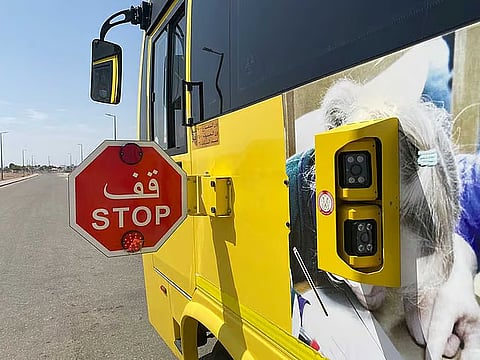Dh1,000 fine, 10 black points for ignoring school bus stop arm in Abu Dhabi
Police warned that violations of the school bus stop sign are detected electronically

Abu Dhabi Police have urged motorists to strictly comply with the rule of making a complete stop when the side-mounted STOP sign arm of a school bus is activated, from both directions and at a minimum distance of five meters, to ensure the safe crossing of students. The police clarified that failure to stop carries a fine of Dh1,000 and 10 traffic points, and warned that violations of the school bus STOP sign are detected electronically.
Mandatory use of the school bus stop arm
Abu Dhabi Police also required school bus drivers to adhere to specific regulations when using the stop arm, to avoid obstructing traffic flow. These include:
Stopping the bus directly in front of the student’s home, unless there are obstacles or roadworks.
Avoiding stops on highways, major roads, or at public bus stops on main roads, as these are considered unsafe locations for students to board or alight.
The police further stressed that school bus drivers must not activate the stop arm while the student remains inside their home, in order to prevent traffic congestion. They also noted that motorists may contest a violation for failing to stop at the stop arm if it is proven that the school bus driver had misused the arm, such as activating it in prohibited locations.
Activation of stop arm safety standards
The requirement to equip school buses with stop arms was reinforced following accidents involving students who made unexpected movements after disembarking. Police explained that some students tend to cross in front of the bus, risking collisions with passing vehicles. To address this, motorists are required to maintain a five-meter safety buffer from school buses whenever the stop arm is extended, giving drivers greater visibility of the area around the bus, especially since students may act unpredictably—such as running across the street—even when disembarking from the right-hand side.
School bus radar enforcement
A specialized radar system has been activated on school buses to detect violations related to failing to stop at the stop arm. Abu Dhabi Police emphasized that, in cooperation with strategic partners, they intensify safety measures at the start of every academic year to ensure that students reach their schools safely. Awareness campaigns are also launched to educate school bus drivers on essential safety protocols.
Abu Dhabi Police reaffirmed their commitment to continuously raising traffic awareness among motorists to reduce the causes of road accidents and minimize resulting fatalities and serious injuries.
Abu Dhabi Police have urged motorists to strictly comply with the rule of making a complete stop when the side-mounted stop sign arm of a school bus is activated, from both directions and at a minimum distance of five meters, to ensure the safe crossing of students. The police clarified that failure to stop carries a fine of Dh1,000 and 10 traffic points, and warned that violations of the school bus stop sign are detected electronically.








